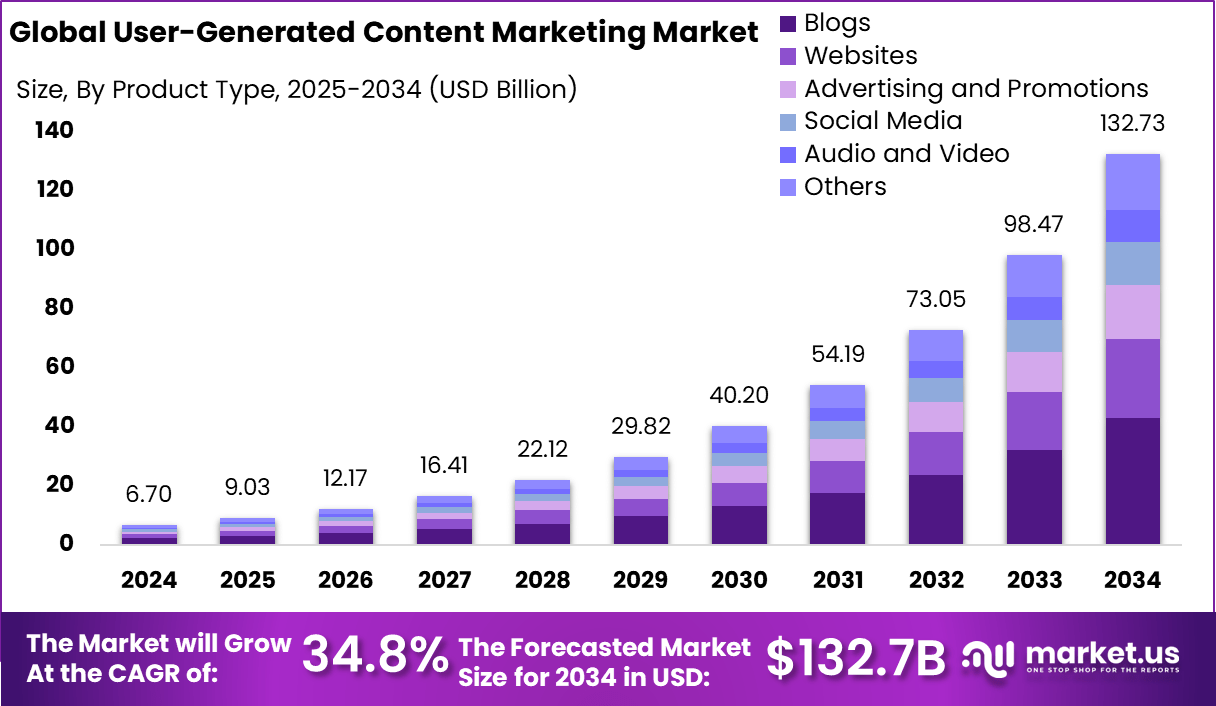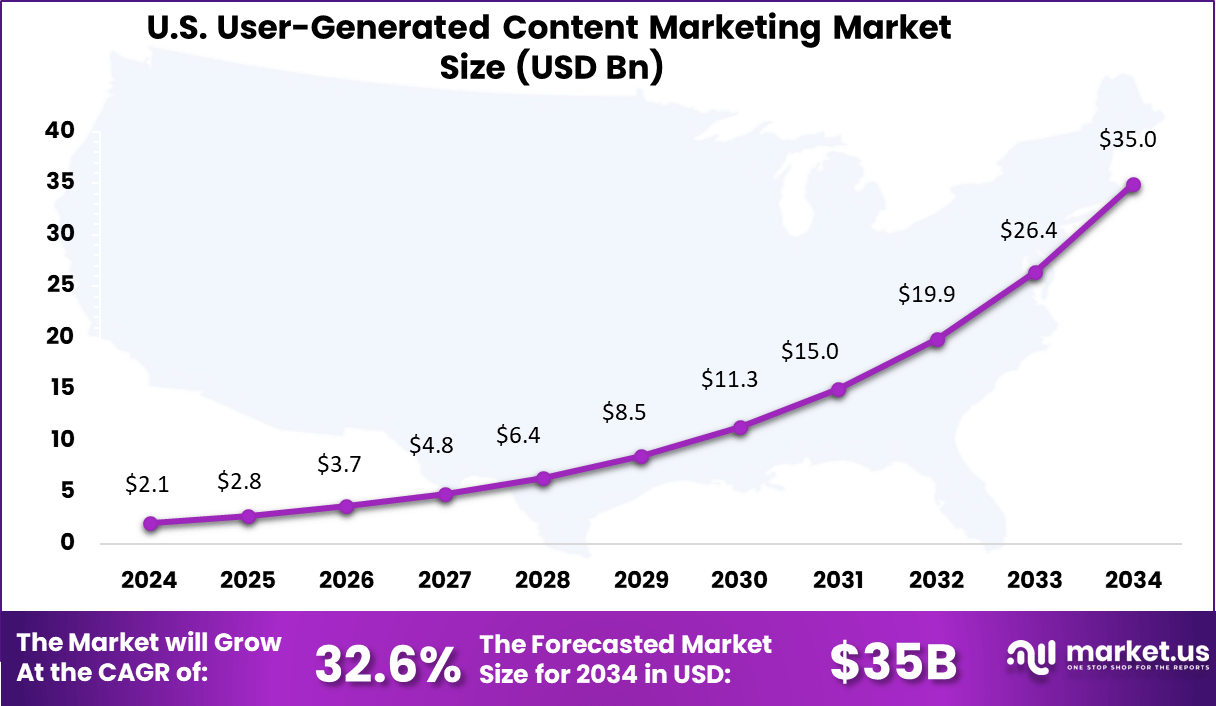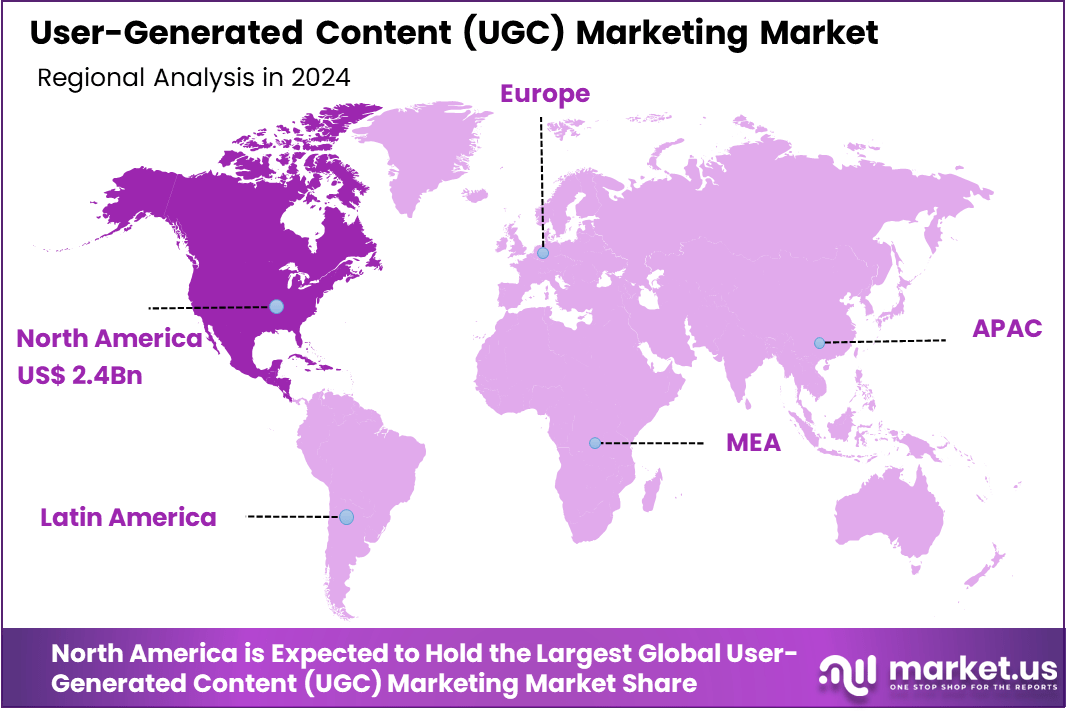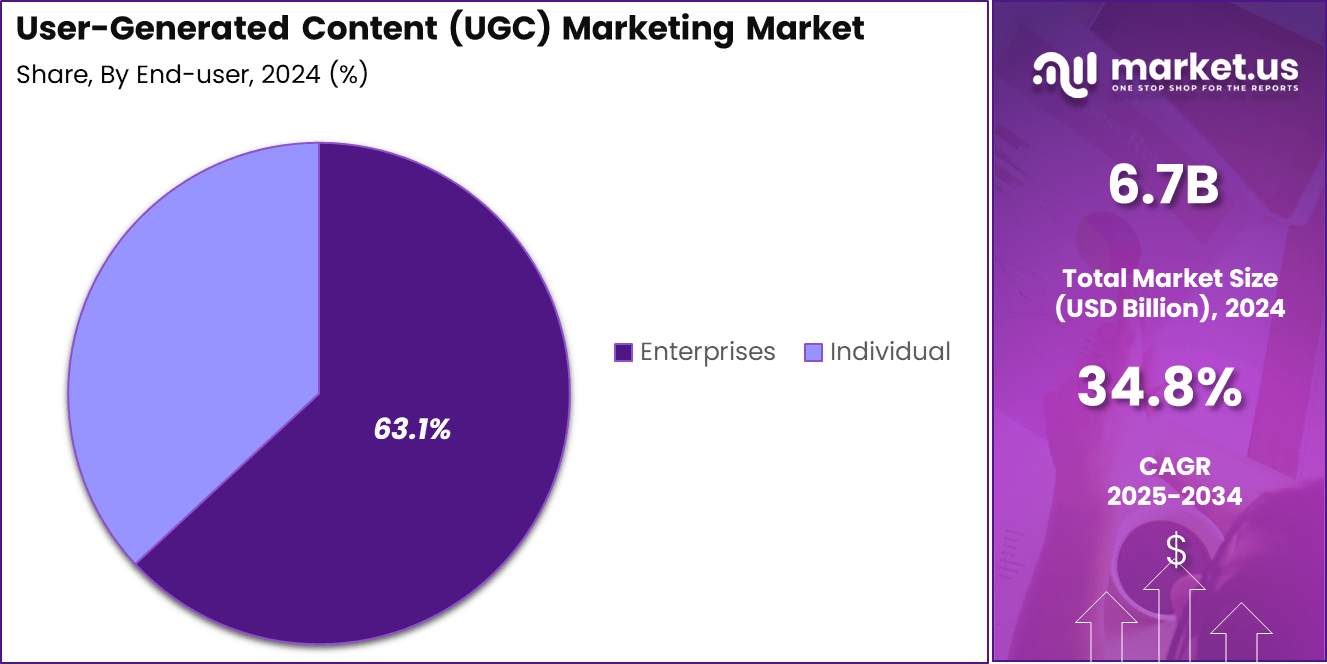Global User-Generated Content (UGC) Marketing Market Size, Share Analysis Report By Product Type (Blogs, Websites, Advertising and Promotions, Social Media, Audio and Video, Others), By End-user (Individual, Enterprises), Region and Companies - Industry Segment Outlook, Market Assessment, Competition Scenario, Trends and Forecast 2025-2034
- Published date: June 2025
- Report ID: 151415
- Number of Pages: 284
- Format:
-
keyboard_arrow_up
Quick Navigation
Report Overview
The Global User-Generated Content (UGC) Marketing Market size is expected to be worth around USD 132.73 Billion By 2034, from USD 6.7 billion in 2024, growing at a CAGR of 34.8% during the forecast period from 2025 to 2034. In 2024, North America held a dominant market position, capturing more than a 36.6% share, holding USD 2.4 Billion revenue.
User-Generated Content (UGC) marketing refers to the strategic use of content created voluntarily by customers or users, including reviews, social media posts, videos, or testimonials. This content is used by brands to build trust, increase engagement, and drive purchase decisions. Because UGC reflects real consumer experiences, it is seen as more authentic than traditional advertising.
The UGC marketing market consists of technology platforms, services, and tools that enable companies to gather, moderate, and share content created by users. These platforms are used across different industries such as retail, travel, fashion, and food to improve marketing efforts, enhance brand trust, and drive customer decisions. The market is growing due to increased smartphone usage, social media activity, and the need for real, engaging content.

The main driver behind UGC marketing is shifting consumer behavior. Audiences are becoming less responsive to polished brand messaging and more influenced by relatable, authentic content shared by everyday users. It is reported that 77% of consumers are more likely to purchase a product after seeing content created by real users.
Demand for UGC solutions is rising across industries, particularly in retail, travel, food, and fashion. Consumers are actively creating content, and brands are increasingly turning to platforms that can manage and scale UGC campaigns. This demand is being met by AI-powered tools that help identify, curate, and deploy high-impact user content across channels.
According to recent findings from Billo, 93% of marketers who incorporate UGC into their campaigns report that it performs significantly better than standard advertising materials. This effectiveness is particularly evident among younger demographics, as UGC influences the purchasing decisions of 70% of Gen Z and 78% of Millennials, underscoring its relevance in shaping consumer behavior.
Looking ahead, the dominance of UGC is expected to intensify. By 2033, it is projected that 78% of all online content will be user-generated, reinforcing its status as a driving force in digital engagement. Social media users have shown a clear preference for this format, with ads containing UGC generating a 73% increase in positive feedback, indicating stronger emotional resonance and trust.
Financially, UGC is deeply embedded in the $24 billion influencer marketing industry, and contributes significantly to the broader creator economy, which is anticipated to reach USD 480 billion by 2027, as per insights from Whop. In the United States alone, spending on UGC content is forecasted to surpass USD 10 billion in 2025, reflecting an 11% increase from USD 9 billion in 2024.
Key Takeaways
- The Global UGC Marketing Market is projected to grow from USD 6.7 Billion in 2024 to USD 132.73 Billion by 2034, registering a strong CAGR of 34.8%.
- North America led the global market in 2024 with over 36.6% share, generating around USD 2.4 Billion in revenue.
- The United States alone contributed USD 2.08 Billion, advancing at a notable CAGR of 32.6% during the forecast period.
- Among product types, Blogs emerged as the leading category, accounting for 32.5% share in 2024, driven by high engagement and brand storytelling value.
- By end-user, Enterprises dominated with 63.1% share, leveraging UGC to enhance authenticity and consumer trust in large-scale marketing campaigns.
Role of AI
Artificial intelligence (AI) has assumed an increasingly prominent role in user-generated content (UGC) marketing, reshaping both creation and distribution in ways that enhance efficiency, authenticity, and performance. AI is empowering brands and creators to scale UGC through enhanced speed and insight generation.
A recent survey of marketers revealed that 93 % utilize AI to generate content more rapidly, 81 % leverage it for advanced analytics, and 90 % employ it to support faster decision‑making. Concurrently, 86 % of users report that AI saves over an hour daily during ideation processes, enabling focus on strategic and relational aspects of campaigns.
The integration of generative AI into UGC development is proving particularly powerful in elevating performance metrics. One study demonstrated that when creators co‑develop with AI for metadata (such as titles), views rose by 7.1 % and watch time by 4.1 %, compared with just 1.6 % and 0.9 % for content fully generated by AI.
In the realm of UGC discovery and moderation, AI-driven tools sift through hundreds or thousands of posts, identify high-performing entries, and deliver them at optimal times. Brands utilizing these tools witness enhanced targeting and authenticity in content delivery.
US Market Expansion
The US User-Generated Content (UGC) Marketing Market is valued at USD 2.1 Billion in 2024 and is predicted to increase from USD 8.5 Billion in 2029 to approximately USD 35 Billion by 2034, projected at a CAGR of 32.6% from 2025 to 2034.

In 2024, North America held a dominant market position, capturing more than a 36.6% share and generating approximately USD 2.4 billion in revenue in the User-Generated Content (UGC) marketing market. This regional leadership can be primarily attributed to the region’s strong digital infrastructure, widespread social media usage, and the maturity of influencer and creator ecosystems.
Consumers in the U.S. and Canada are not only highly active across platforms such as Instagram, TikTok, and YouTube, but they also exhibit greater trust in content shared by peers and everyday users rather than traditional advertising. As a result, brands across industries have steadily shifted budgets toward UGC campaigns, recognizing that authenticity drives higher engagement and conversions.

By Product Type Analysis
In 2024, the Blogs segment held a dominant market position, capturing more than 32.5% of the overall User-Generated Content (UGC) marketing market. This leadership can be attributed to the continued relevance of long-form content in building consumer trust, enhancing search engine visibility, and establishing subject-matter authority.
Blogs remain a preferred UGC format for brands aiming to deliver in-depth narratives, customer testimonials, product reviews, and tutorials. The popularity of blog-driven UGC is further supported by the ease of content creation among users and advocates, particularly in niche communities such as lifestyle, wellness, technology, and travel.
Readers often perceive blog posts by real users or brand communities as more honest and relatable compared to direct marketing. Additionally, advancements in CMS platforms and affiliate integration have allowed creators to monetize their blogs more efficiently, driving continued content contributions.
By End-user Analysis
In 2024, the Enterprises segment held a dominant market position, capturing more than a 63.1% share, driven by increasing corporate adoption of user-generated content (UGC) to strengthen brand identity, credibility, and consumer engagement. UGC empowers enterprises to showcase authentic customer experiences, product reviews, and real-life usage, all of which resonate more effectively with audiences than traditional marketing alone.
Enterprises across retail, fashion, beauty, travel, and technology sectors have aggressively integrated UGC into their digital strategies to humanize their branding, improve product credibility, and boost conversion rates. The scalability of UGC allows companies to crowdsource authentic narratives, images, reviews, and testimonials from real users, which are then repurposed across websites, social media, email campaigns, and even in offline advertising formats.
Large businesses have also been investing in dedicated UGC platforms and AI-driven content curation tools to moderate, analyze, and distribute consumer content more efficiently. These technologies help enterprises maintain brand consistency while enabling hyper-personalized campaigns. Moreover, the use of influencer communities and advocacy programs has strengthened enterprise-level UGC initiatives by fostering long-term engagement and loyalty among users.

Key Market Segments
By Product Type
- Blogs
- Websites
- Advertising and Promotions
- Social Media
- Audio and Video
- Others
By End-user
- Individual
- Enterprises
Key Regions and Countries
- North America
- US
- Canada
- Europe
- Germany
- France
- The UK
- Spain
- Italy
- Russia
- Netherlands
- Rest of Europe
- Asia Pacific
- China
- Japan
- South Korea
- India
- Australia
- Singapore
- Thailand
- Vietnam
- Rest of Latin America
- Latin America
- Brazil
- Mexico
- Rest of Latin America
- Middle East & Africa
- South Africa
- Saudi Arabia
- UAE
- Rest of MEA
Emerging Trends
Integration of Augmented and Virtual Reality in UGC
A significant emerging trend in UGC marketing is the incorporation of Augmented Reality (AR) and Virtual Reality (VR) into user-generated content creation. Brands are enabling users to co-create interactive and immersive experiences using AR filters, virtual try-ons, and 3D content layers within social platforms. This development is reshaping the way users engage with content, transitioning from static text or video to dynamic and participatory brand storytelling environments.
This shift toward immersive UGC formats enhances user engagement by offering experiential interactions. Such content tends to be more memorable and emotionally resonant, which contributes to higher levels of sharing and deeper brand affinity. As AR/VR toolkits become more accessible through smartphones and creative platforms, their integration into UGC campaigns is expected to continue influencing digital marketing strategies globally.
Driver
AI-Powered Curation and Personalization
The advancement of artificial intelligence has become a pivotal driver in the UGC marketing ecosystem. AI technologies now assist in moderating user submissions, identifying high-performing content, and enabling tailored content distribution across various audience segments.
These capabilities help marketers handle large volumes of user input efficiently while ensuring relevance and brand safety. In addition to content filtration, AI algorithms analyze metadata, engagement signals, and sentiment to curate content that aligns with campaign goals.
This automation not only reduces human workload but also enhances the effectiveness of UGC by ensuring that only the most engaging and contextually appropriate material reaches target consumers. Such intelligent content handling drives measurable improvements in user engagement and return on marketing investment.
Restraint
Regulatory and Operational Challenges in Moderation
One of the primary restraints facing the UGC marketing domain is the growing complexity and cost of content moderation in alignment with regulatory standards. With the increasing volume of user contributions, brands are compelled to invest in hybrid moderation systems that combine automated tools with manual human oversight.
This dual-layer approach significantly increases operational costs and requires consistent resource allocation. Furthermore, evolving data privacy regulations – such as GDPR and CCPA – place additional constraints on how user-generated data can be stored, processed, and shared.
These laws demand strict compliance in terms of consent, transparency, and user control, making it increasingly difficult for marketers to fully leverage UGC at scale. This legal environment has necessitated more robust compliance infrastructures, which not all businesses are currently equipped to manage.
Opportunity
Intelligent UGC Platforms with Real-Time Moderation
Advancements in AI moderation present a major opportunity for UGC marketing strategies. Emerging platforms are incorporating pre-emptive moderation tools capable of detecting harmful, off-brand, or non-compliant content before it becomes publicly visible.
This innovation allows brands to uphold quality and compliance standards without sacrificing content volume or speed. Additionally, AI-enabled discovery tools are helping brands identify user-generated content that demonstrates high emotional impact, visual quality, or thematic alignment with campaign objectives.
By utilizing real-time analytics and contextual filters, marketers can amplify the reach of highly effective content and drive better audience engagement. These platforms are not only improving efficiency but also increasing the authenticity and trustworthiness of UGC campaigns.
Challenge
Preserving Authenticity Amid Automation
A major challenge within the UGC space is maintaining authenticity while implementing automated systems for content curation and moderation. Over-reliance on AI can lead to the sanitization of user input, stripping content of its natural tone and individuality.
This risks undermining the very attribute that makes UGC effective – its relatability and raw emotional appeal. To address this issue, brands must strike a balance between automated efficiency and human oversight.
Authenticity must remain a core objective by ensuring that user voices are preserved in their original form wherever possible. This involves allowing minor imperfections and diverse expressions to remain visible, thereby reinforcing consumer trust and enhancing emotional engagement across digital channels.
Key Player Analysis
The UGC marketing sector is driven by major platforms such as Bazaarvoice, CrowdRiff, and Curalate. Bazaarvoice provides review management and social content services. It supports major brands through its syndication network and AI-driven moderation.
CrowdRiff focuses on visual storytelling and destination marketing. Curalate enables social commerce with shoppable images and analytics. Each of these players offers scalable solutions. Their tools help enterprises source and moderate UGC efficiently. This assists in building trust, boosting engagement, and reinforcing brand identity.
Monotype Imaging, Olapic, Pancake Laboratories, and Pixlee TurnTo further enhance the UGC ecosystem. Monotype combined with Olapic, leveraging AI to generate curated visual content. Pancake Labs enables streamlined UGC gathering through mobile and social channels.
Pixlee TurnTo delivers community content and integrates with e‑commerce platforms. These vendors enhance content authenticity and social proof. Their offerings are used across retail, travel, and lifestyle industries. They respond to growing demands by enterprises for moderated and shoppable user content.
Top Key Players Covered
- Bazaarvoice
- CrowdRiff
- Curalate, Inc.
- Monotype Imaging Inc.
- Olapic Inc.
- Pancake Laboratories, Inc.
- Pixlee TurnTo
- Stackla Pty Ltd.
- TINT
- Yotpo Ltd
- Others
Recent Developments
- In October 2024, Bazaarvoice introduced Vibe, a unified UGC and social commerce platform designed to source, amplify, convert, and manage community‑generated content across channels. This launch, announced at GroceryShop, enhances the firm’s full‑funnel value proposition by integrating creator marketing, social media, campaigns, product sampling, real‑time analytics, earned media valuation, and revenue attribution into a single environment.
Report Scope
Report Features Description Market Value (2024) USD 6.7 Bn Forecast Revenue (2034) USD 132.7 Bn CAGR (2025-2034) 34.8% Base Year for Estimation 2024 Historic Period 2020-2023 Forecast Period 2025-2034 Report Coverage Revenue forecast, AI impact on market trends, Share Insights, Company ranking, competitive landscape, Recent Developments, Market Dynamics and Emerging Trends Segments Covered By Product Type (Blogs, Websites, Advertising and Promotions, Social Media, Audio and Video, Others), By End-user (Individual, Enterprises) Regional Analysis North America – US, Canada; Europe – Germany, France, The UK, Spain, Italy, Russia, Netherlands, Rest of Europe; Asia Pacific – China, Japan, South Korea, India, New Zealand, Singapore, Thailand, Vietnam, Rest of Latin America; Latin America – Brazil, Mexico, Rest of Latin America; Middle East & Africa – South Africa, Saudi Arabia, UAE, Rest of MEA Competitive Landscape Bazaarvoice, CrowdRiff, Curalate, Inc., Monotype Imaging Inc., Olapic Inc., Pancake Laboratories, Inc., Pixlee TurnTo, Stackla Pty Ltd., TINT, Yotpo Ltd, Others Customization Scope Customization for segments, region/country-level will be provided. Moreover, additional customization can be done based on the requirements. Purchase Options We have three license to opt for: Single User License, Multi-User License (Up to 5 Users), Corporate Use License (Unlimited User and Printable PDF)  User-Generated Content Marketing MarketPublished date: June 2025add_shopping_cartBuy Now get_appDownload Sample
User-Generated Content Marketing MarketPublished date: June 2025add_shopping_cartBuy Now get_appDownload Sample -
-
- Bazaarvoice
- CrowdRiff
- Curalate, Inc.
- Monotype Imaging Inc.
- Olapic Inc.
- Pancake Laboratories, Inc.
- Pixlee TurnTo
- Stackla Pty Ltd.
- TINT
- Yotpo Ltd
- Others













